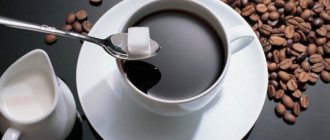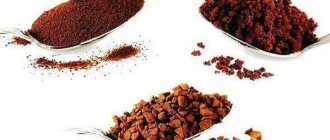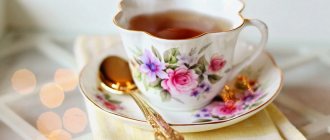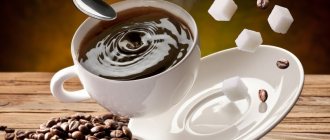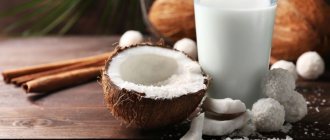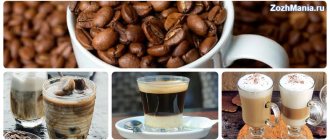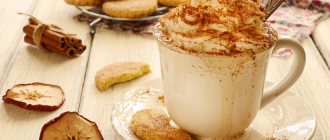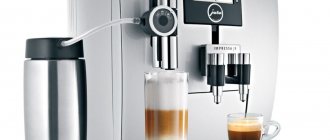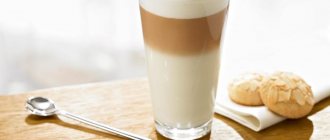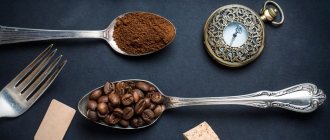Milk is the most popular additive in coffee. Most people prefer milk coffee drinks, as they are milder in taste and do not feel the bitterness or sourness of coffee. Any coffee shop has a huge selection of coffee and milk-based drinks, much more than pure black drink. Milk is poured hot and cold, whipped, and foam is made. Some add sugar, but most avoid it and drink their drinks as they are served. For those who control their diet, it is important to know the calorie content of coffee with milk without sugar.
How many calories are in coffee with milk without sugar?
There is no single exact number. Much depends on the volume and quality of the dairy product, and to a lesser extent on coffee. Coffee beans contain almost no calories, and the fats and sugars present are baked in when roasted. Soluble granules have a higher energy value, but they also cannot affect overall caloric intake as much as dairy products. Therefore, first we will consider the calorie content of milk of all types and types of fat content.
According to the standard, energy values are written on packages per 100 ml, but most people add about a tablespoon per cup (for a medium cup) or about 2.5 tablespoons for a large mug. You can use this data as a guide, or calculate exactly how much milk you pour into your favorite drink.
Calorie table for different types of milk
| Type of milk | Calories per 100 grams | Calories per 20 ml serving (tablespoon) | Calories per 50 ml (2.5 tablespoons) serving |
| Fat content 0.1% | 31 | 6 | 16 |
| Fat content 0.5% | 36 | 7 | 18 |
| Fat content 1.5% | 44 | 9 | 22 |
| Fat content 2.5% | 52 | 10 | 26 |
| Fat content 3.2% | 58 | 12 | 29 |
| Fat content 3.5% | 61 | 12 | 31 |
| Domestic cow | 64 | 13 | 32 |
| Dry whole | 476 | 95 | 238 |
| Dry low fat | 350 | 70 | 175 |
| Soy 0.1% | 28 | 6 | 14 |
| Soy 0.6% | 43 | 9 | 22 |
| Condensed without sugar | 75 | 15 | 38 |
Calories in grams
The calorie content of coffee without food additives, stabilizers and fillers depends on the type of product:
- ground;
- in grains;
- in granules or soluble powder.
Natural coffee (roasted whole beans) contains 331 kcal per 100 grams. However, the number of calories decreases when brewing the drink. Black coffee (espresso) per 100 ml contains only 1-2 kcal. The drink is low-calorie, dietary (in the absence of cream, sugar, spices and dairy products).
Instant coffee without added sugar in a cup (200 ml) contains up to 12-14 kcal.
Expert opinion
Vadim Kudryavtsev
Coffee expert, professional barista and simply in love with this aromatic drink.
Ask the barista a question
A slight increase in nutritional value is noted due to the composition of the powder. Granules contain about 18-20% coffee powder. The rest of the mass consists of emulsifiers, safe coloring agents, thickeners that change the natural taste of the grains.
It is necessary to take into account differences in the composition of the product (in granules, powder) from different manufacturers.
Calorie content per 100 g for different brands:
- Nescafe Gold – 49;
- Egoiste – 90;
- Carte Noire – 100;
- Ambassador – 329;
- Milagro Gold – 150;
- Jardin - 92.
The number of calories in 100 g of ground coffee rises to 202 kcal; 1 tsp. ground product contains 8-12; 100 grams of dry roasted coffee – 223.
The share of BJU coffee is (per 100 g):
- proteins - 28%;
- fats – 64%;
- dietary fiber – 12.8%;
- carbohydrates – 8%;
- water – 0.26%.
Interesting! Which countries rank first in coffee consumption?
How many kcal are in coffee with various additives?
The consistency, nutritional and energy value of products depend on the characteristics of the fillers. Adding milk or cream softens the taste; The change in calorie content is affected by the consistency and degree of fat content. In 100 g of low-fat milk (1% fat content) – 42 kcal, in a product with 2.5% fat content – 54.
Do you count calories?
Not really
In 1 tbsp. l. Milk of varying degrees of fat content has the following caloric content proportions:
- 6 (0,1%);
- 7 (0,5%);
- 10 (2,5%);
- 12 (3,2-3,5%).
The increase in calorie content of a drink with milk depends on the added portion. You can place 2 tablespoons of milk in a mug, increasing the nutritional value by 5-7 kilocalories; calorie content of a cup (espresso) with 2 tsp. milk reaches about 22.
The calorie content of coffee with sugar increases. When adding 2 tsp to a cup. granulated sugar, the drink has an indicator of 68; instant coffee with 1 spoon of sugar – 45-56; granulated without granulated sugar with milk – 10-15.
Portioned cream (10% fat) in beverage packaging contains 118 kcal per 100 g of product. When measuring the nutritional value of a coffee drink, the amount of creamer added is taken into account.
Black coffee with sugar can increase its calorie content with the addition of spices. Cinnamon gives it a spicy taste. The norm for a cup of coffee is 0.5 tsp. (3 g) cinnamon. The nutritional value of cinnamon powder per 100 g is 247 kcal; increase in nutritional value for a standard cup - 7.5.
To highlight the taste, honey is used, the calorie content of which is 304-415 kcal per 100 g.
When adding the following seasonings, the number of calories per gram is taken into account:
- cardamom – 3;
- vanilla – 3;
- dried ginger – 1;
- nuts – 5;
- cloves – 3;
- cinnamon powder – 2.5;
- ginger root - 3.5, etc.
Increases the calorie content of coffee with the addition of condensed milk - per 100 g. products contain 330 kcal. Using chocolate syrup as a filler will increase the number of kcal by 15, classic ice cream weighing about 50 g - by 100-112.
Interesting! At what age can children drink coffee, its effect on the body
Calorie content of natural coffee with milk without sugar
Coffee beans have a low energy value - on average, 2-4 kcal per 200 ml of finished drink. If you add milk from a carton or tetra-pack, add 2-4 calories per serving of dairy product and you will get a fairly accurate number.
Example: we brew 200 ml of coffee in a Turk, this is 4 calories. And add 50 ml of milk with 1.5% fat - that’s another 22 kcal. A 250 ml cup of drink produces 26 kcal.
The difference of +/- 5 calories for one drink made from natural grains does not play a role in a daily diet of 1500-2000 kcal.
But quite often we drink coffee with milk in coffee shops, in the form of ready-made drinks, and the amount of milk in them varies. As a rule, coffee shops purchase milk with a fat content of at least 3%, and more often - 3.2% or 3.5%. It produces an elastic, durable foam of a pleasant color that holds well. The foam from a low-fat or medium-fat product is often grayish and falls off quickly. 3.5% milk gives a delicate, creamy taste, and it is usually chosen for coffee shops, also used for those drinks where the milk does not need to be frothed.
Calorie content of unsweetened coffee
| Drink | Portion, ml | Calories per serving |
| Ristretto | 15 | 1 |
| Espresso | 30 | 2 |
| Americano | 180 | 2,2 |
| Cappuccino | 180 | 210 |
| Americano double | 240 | 4,4 |
| Filter coffee in a drip coffee maker (regular) | 220 | 2 |
| Filter coffee in Chemex | 240 | 3 |
| Filter coffee in an AeroPress | 220 | 3,5 |
| Filter coffee in French press | 200 | 4 |
| Coffee brewed with cold water | 240 | 6 |
| Latte | 180 | 62 |
| Coffee with milk | 250 | 27 |
| In Turkish, in cezve | 200 | 4 |
| Soluble granular | 200 | 12 |
| Coffee with cream | 250 | 40 |
| Mochaccino | 250 | 290 |
| Soluble freeze-dried | 200 | 24 |
| Chicory | 240 | 46 |
| Glasse | 180 | 125 |
| Green coffee | 220 | 0 |
| Decaffeinated coffee | 220 | 5 |
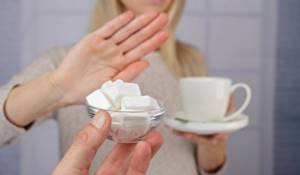
Types of coffee drinks: how much milk and calories they contain
As a rule, milk coffee drinks are prepared on the basis of espresso, single or double. Different chains have their own recipes and volumes of the drink, and therefore the calorie content. The table below presents popular drinks from well-known chain establishments.
| Name of chain and type of drink | A portion | Calorie content |
| Coffeemania Cappuccino | 330 | 90 |
| Coffeemania Cappuccino | 450 | 160 |
| Coffeemania Latte | 330 | 156 |
| Coffeemania Latte | 450 | 218 |
| Coffeemania Flat White | 430 | 130 |
| CoffeeHouse Double Cappuccino | 100 | 64 |
| CoffeeHouse Latte | 100 | 44 |
| Chocolate Cappuccino | 100 | 35 |
| Chocolate Latte | 400 | 220 |
| Chocolate Cappuccino Light | 320 | 125 |
| Starbucks Cappuccino Grande | 350 | 140 |
| Starbucks Latte Grande | 350 | 220 |
| Starbucks Latte low fat | 350 | 112 |
| Starbucks Cappuccino low fat | 100 | 20 |
| McDonalds Cappuccino | 300 | 123 |
| McDonalds Latte | 300 | 132 |
Calorie content of instant coffee with milk without sugar
Instant granules themselves are much higher in calories than natural grains. The fact is that during their production, only 15-20% of natural grain remains, the rest are emulsifiers, thickeners, dyes, stabilizers, impurities and the like. The taste also changes noticeably. And that's why most people add more dairy to instant coffee than to natural coffee to remove the chemical tastes of bitterness or acidity.
If you use powdered milk, keep in mind that it significantly increases the calorie content! 70-90 kcal in one tablespoon!
On average, we can assume that one teaspoon of soluble granules or powder contains about 10 calories. Some manufacturers have 4-5 (Nescafe), some have about 20 (Tchibo). You can find the exact information on the packaging, but if this is not possible, calculate based on 10 kcal per serving. Add to this the amount of milk product that you add - for a large mug it will be about 50 ml, for a small one - about 20.
Example: you prepare 250 ml of Carte Noire, add 2 heaped teaspoons, you get about 20 grams of granules, that is, about 20 calories. And add 50 ml of milk 2.5% fat - another 26 calories. In 300 ml of the finished drink you have 46 kcal.
Chemical composition of coffee
Caffeine belongs to the group of alkaloids that stimulate the central nervous system. For the first time, caffeine was obtained from coffee beans, which is why it got its name. The drink owes its tonic effect, increasing mental and physical performance, to caffeine.
According to modern requirements, when making coffee, there must be at least 0.7% caffeine in it, which directly depends on the degree of ripening of the coffee beans and their roasting.
At this concentration, one teaspoon of freshly ground natural coffee will contain 0.1-0.2 grams of pure caffeine, which is quite enough to obtain the appropriate tonic effect.
It is not recommended to exceed the dose of caffeine above 0.3 grams at a time for 3-4 hours - regular excess of the dosage stimulates the manifestation of increased excitability, sleep disturbances, and increased heart function.
Trigonelline is an alkaloid, in its pure form, tasteless and odorless, but during heat treatment it is converted into pyridine, a substance that gives coffee a specific aroma. Another striking chemical property of trigonelline is its close chemical relationship with nicotinic acid (vitamin B3). The nicotinic acid molecule is part of trigonelline and is easily released when heated, which ensures a constant amount of vitamin B3 in the drink.
Vitamin B3 plays a vital role in metabolism in the body and stimulates the activity of the nervous system. A lack of this vitamin leads to a disease such as pellagra.
Nicotinic acid is not the only B vitamin found in coffee beans. After appropriate processing of natural coffee, the drink contains the entire palette of vitamins of this group, as well as:
- the mandatory presence of vitamin A, which is involved in growth and development;
- vitamin D, which improves the absorption of calcium and phosphorus in the intestines;
- vitamin E, which is a participant in the reproduction process and a stimulator of the immune system.
Coffee contains a significant amount of complex organic compounds. These are proteins and amino acids that perform nutritional and energy functions for the cells of the body. Coffee beans are one of the rare plant products that contain essential amino acids that the body gets from meat and fish. Such amino acids are not synthesized in the human body and participate in the restorative functions of cellular mechanisms and maintain immunity at a fairly high level.
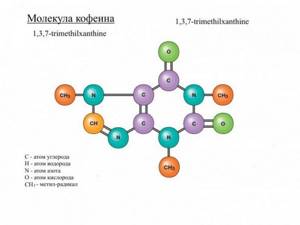
Caffeine molecule structure
The total amount of carbohydrates in raw coffee beans is about 50% of its weight. These energetically valuable substances for the body are represented by both simple sugars - sucrose and fructose, and complex polysaccharides - cellulose, fiber, pectin substances, which represent an indispensable basis for the nutrition of nerve cells of the brain.
You might be wondering: Is it true that coffee removes calcium from the body?
Mineral substances in coffee include potassium, magnesium and calcium . These inorganic elements make up bones, ensure muscle function, and regulate the functioning of the heart, blood vessels and brain.
Raw coffee beans contain about 850 different essential compounds, and roasted coffee beans contain about 350, which is why coffee has deservedly been awarded the title of the most fragrant drink.
Conclusions:
- Dairy products contain 1.5-3.5% fat - 10-12 kcal per tablespoon. A natural drink has about 4 kcal per 200 ml, and instant coffee has about 10. It’s easy to calculate the average calorie content.
- In coffee shops, a latte has more calories than a cappuccino, because milk with at least 3% fat content is used, and a latte has more of it.
- The more dairy product (milk, foam) in a cup, the more calories you will get.
- If you prefer natural coffee, you don’t have to count calories per cup - there are no more than 4-6, which is almost insignificant for the overall diet.
